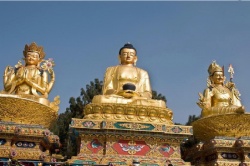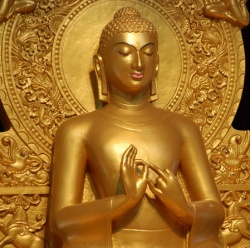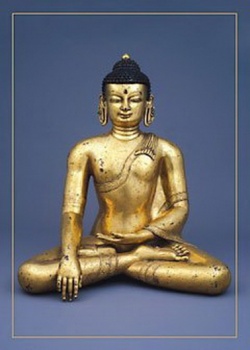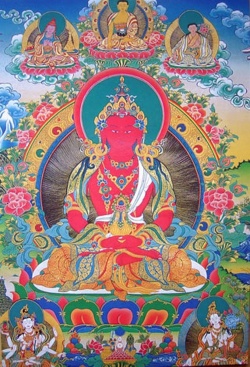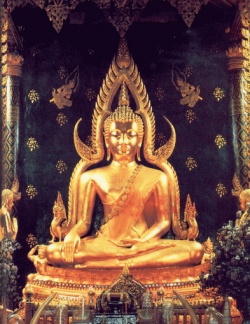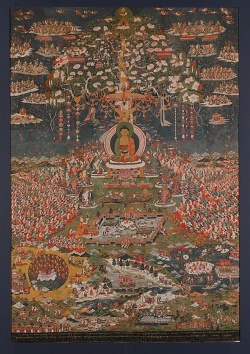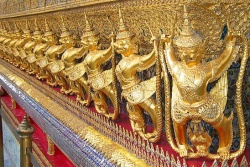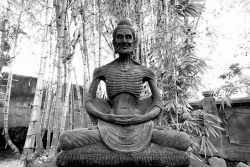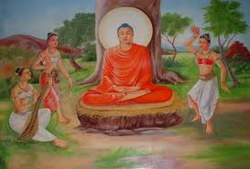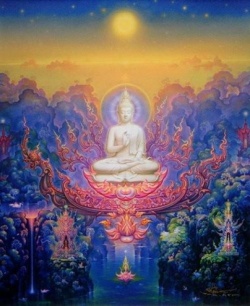Difference between revisions of "Brahmanimantika Sutta"
m (1 revision: Robo replace 16sept) |
|||
| Line 10: | Line 10: | ||
Translator's Introduction | Translator's Introduction | ||
[[File:Golden-buddha.jpg|thumb|250px|]] | [[File:Golden-buddha.jpg|thumb|250px|]] | ||
| − | In this [[sutta]], the [[Buddha]] faces two antagonists: [[Baka]], a [[brahma]] who believes that his [[brahma]]-attainment is the [[highest]] [[attainment]] there is; and [[Mara]], who wants (1) to keep [[Baka]] under his [[power]] by allowing [[Baka]] to maintain his deluded opinion, and (2) to prevent the [[Buddha]] from sharing his [[awakened]] [[knowledge]] with others. Of the two, [[Mara]] is the more insidious, a point illustrated by the fact that [[Mara]] always speaks through someone else and never directly shows his face. (Another [[interesting]] point is illustrated by the fact that [[Mara]] is the source of the demand that one obey a [[creator]] [[god]].) | + | In this [[sutta]], the [[Buddha]] faces two antagonists: [[Baka]], a [[brahma]] who believes that his [[brahma]]-[[attainment]] is the [[highest]] [[attainment]] there is; and [[Mara]], who wants (1) to keep [[Baka]] under his [[power]] by allowing [[Baka]] to maintain his deluded opinion, and (2) to prevent the [[Buddha]] from sharing his [[awakened]] [[knowledge]] with others. Of the two, [[Mara]] is the more insidious, a point illustrated by the fact that [[Mara]] always speaks through someone else and never directly shows his face. (Another [[interesting]] point is illustrated by the fact that [[Mara]] is the source of the demand that one obey a [[creator]] [[god]].) |
[[File:390796148.jpg|thumb|250px|]] | [[File:390796148.jpg|thumb|250px|]] | ||
| − | In [[overcoming]] his antagonists, the [[Buddha]] asserts the superiority of his [[knowledge]] in two major fashions: through a description of his [[awakened]] [[knowledge]] and through a display of [[psychic]] [[powers]]. | + | In [[overcoming]] his antagonists, the [[Buddha]] asserts the {{Wiki|superiority}} of his [[knowledge]] in two major fashions: through a description of his [[awakened]] [[knowledge]] and through a display of [[psychic]] [[powers]]. |
[[File:Amb2.jpg|thumb|250px|]] | [[File:Amb2.jpg|thumb|250px|]] | ||
The [[Buddha]] describes his [[awakened]] [[knowledge]] in a variety of ways: | The [[Buddha]] describes his [[awakened]] [[knowledge]] in a variety of ways: | ||
| Line 23: | Line 23: | ||
by asserting that he has abandoned all possible [[conditions]] that would lead to further [[rebirth]]. | by asserting that he has abandoned all possible [[conditions]] that would lead to further [[rebirth]]. | ||
[[File:Golenbuddha.JPG|thumb|250px|]] | [[File:Golenbuddha.JPG|thumb|250px|]] | ||
| − | Some of these assertions — in particular, the [[assertion]] of a [[consciousness]] not mediated by any of the [[six senses]] — are extremely important [[dhamma]] lessons, which are further explained in the notes. But as the [[sutta]] shows, even the [[Buddha's]] description of these teachings was not enough to win over [[Baka]] or the members of his following. They were convinced only when the [[Buddha]] then performed a feat of [[psychic]] [[power]] that (1) even [[Baka]] could not fathom and (2) illustrated the [[Buddha's]] major point. Up to then, in identifying [[Mara]] and the range of [[Baka's]] [[power]], the [[Buddha]] was in effect saying, "I see you, but you don't see me." With his display of [[psychic]] [[power]], in which [[brahma]] and his following could not see him but could hear his {{Wiki|voice}}, he demonstrated his point in such graphic terms that [[Baka]] and his following were immediately won over. | + | Some of these assertions — in particular, the [[assertion]] of a [[consciousness]] not [[mediated]] by any of the [[six senses]] — are extremely important [[dhamma]] lessons, which are further explained in the notes. But as the [[sutta]] shows, even the [[Buddha's]] description of these teachings was not enough to win over [[Baka]] or the members of his following. They were convinced only when the [[Buddha]] then performed a feat of [[psychic]] [[power]] that (1) even [[Baka]] could not fathom and (2) illustrated the [[Buddha's]] major point. Up to then, in identifying [[Mara]] and the range of [[Baka's]] [[power]], the [[Buddha]] was in effect saying, "I see you, but you don't see me." With his display of [[psychic]] [[power]], in which [[brahma]] and his following could not see him but could hear his {{Wiki|voice}}, he demonstrated his point in such graphic terms that [[Baka]] and his following were immediately won over. |
[[File:2io1 500.jpg|thumb|250px|]] | [[File:2io1 500.jpg|thumb|250px|]] | ||
| − | In this way, the protagonists of this [[sutta]] react in a way very different from that of a typical {{Wiki|modern}} reader. We at present, when reading this [[sutta]], may be more impressed with the [[Buddha's]] explanation of his [[awakened]] [[knowledge]] than we are with the account of his display of [[psychic]] [[power]], for after all, both aspects of the [[sutta]] — the description of the [[Buddha's]] [[knowledge]] and the description of his [[psychic]] [[power]] — are, for us, just that: descriptions. But, for those who witnessed it, his display of [[power]] was an undeniable fact that went [[beyond]] words. They saw him go [[beyond]] their range. Prior to that display, they regarded his claims of [[knowledge]] simply as that: mere claims. When he showed, however, that he could perform a [[miracle]] that even [[Baka]] could not perform, they were forced to concede his superiority. Thus this [[sutta]] imparts a lesson often forgotten at present, that the [[Buddha]] taught not only by [[word]] but also by example, and that some of his examples required a [[dimension]] of [[power]] that even the [[gods]] could not match. | + | In this way, the protagonists of this [[sutta]] react in a way very different from that of a typical {{Wiki|modern}} reader. We at {{Wiki|present}}, when reading this [[sutta]], may be more impressed with the [[Buddha's]] explanation of his [[awakened]] [[knowledge]] than we are with the account of his display of [[psychic]] [[power]], for after all, both aspects of the [[sutta]] — the description of the [[Buddha's]] [[knowledge]] and the description of his [[psychic]] [[power]] — are, for us, just that: descriptions. But, for those who witnessed it, his display of [[power]] was an undeniable fact that went [[beyond]] words. They saw him go [[beyond]] their range. Prior to that display, they regarded his claims of [[knowledge]] simply as that: mere claims. When he showed, however, that he could perform a [[miracle]] that even [[Baka]] could not perform, they were forced to concede his {{Wiki|superiority}}. Thus this [[sutta]] imparts a lesson often forgotten at {{Wiki|present}}, that the [[Buddha]] taught not only by [[word]] but also by example, and that some of his examples required a [[dimension]] of [[power]] that even the [[gods]] could not match. |
[[File:Garudakar.jpg|thumb|250px|]] | [[File:Garudakar.jpg|thumb|250px|]] | ||
| − | Strictly speaking, of course, the [[Buddha's]] display of [[power]] did not prove that he had gone [[beyond]] becoming. After all, in becoming {{Wiki|invisible}} to [[Baka]], he may simply have gone to another level of becoming of which [[Baka]] was unaware. However, the [[Buddha]] correctly surmised that a display of [[power]] would subdue the {{Wiki|pride}} of his listeners, [[awaken]] a [[sense]] of conviction in his [[attainment]], and thus enable them to enter the [[path]] of practice. As he states in MN 27, only when one sees the [[four noble truths]] — usually a synonym for [[stream-entry]] — is one's conviction in the [[Buddha's]] [[Awakening]] confirmed. Only when one puts an end to one's [[mental fermentations]] does one have firm proof of the [[Buddha's]] [[Awakening]]. The [[Buddha]] notes in DN 11 that a display of [[psychic]] [[powers]] can sometimes backfire, in that one's audience might assume that one is engaging in cheap [[magic]] tricks. Thus, instead of inspiring conviction, the display simply {{Wiki|increases}} [[doubt]]. Nevertheless, there are other instances in the [[Canon]] — most notably in the story of the [[Kassapa]] brothers (Mv.I.15-22) and that of [[Angulimala]] (MN 86) — where the [[Buddha]] was able to display his [[powers]] to good effect. Still, because he could not [[trust]] even his [[arahant]] [[disciples]] to possess his same [[sense]] of when such [[powers]] would work and when they would backfire, he forbade his [[disciples]] from displaying [[psychic]] [[powers]] to [[lay people]]. (See Cv.V.8; [[Buddhist]] [[Monastic]] Code, vol. 2, chapter 10.) | + | Strictly {{Wiki|speaking}}, of course, the [[Buddha's]] display of [[power]] did not prove that he had gone [[beyond]] becoming. After all, in becoming {{Wiki|invisible}} to [[Baka]], he may simply have gone to another level of becoming of which [[Baka]] was unaware. However, the [[Buddha]] correctly surmised that a display of [[power]] would subdue the {{Wiki|pride}} of his listeners, [[awaken]] a [[sense]] of conviction in his [[attainment]], and thus enable them to enter the [[path]] of practice. As he states in MN 27, only when one sees the [[four noble truths]] — usually a {{Wiki|synonym}} for [[stream-entry]] — is one's conviction in the [[Buddha's]] [[Awakening]] confirmed. Only when one puts an end to one's [[mental fermentations]] does one have firm [[proof]] of the [[Buddha's]] [[Awakening]]. The [[Buddha]] notes in DN 11 that a display of [[psychic]] [[powers]] can sometimes backfire, in that one's audience might assume that one is engaging in cheap [[magic]] tricks. Thus, instead of inspiring conviction, the display simply {{Wiki|increases}} [[doubt]]. Nevertheless, there are other instances in the [[Canon]] — most notably in the story of the [[Kassapa]] brothers (Mv.I.15-22) and that of [[Angulimala]] (MN 86) — where the [[Buddha]] was able to display his [[powers]] to good effect. Still, because he could not [[trust]] even his [[arahant]] [[disciples]] to possess his same [[sense]] of when such [[powers]] would work and when they would backfire, he forbade his [[disciples]] from displaying [[psychic]] [[powers]] to [[lay people]]. (See Cv.V.8; [[Buddhist]] [[Monastic]] Code, vol. 2, chapter 10.) |
[[File:42 d9da.jpg|thumb|250px|]] | [[File:42 d9da.jpg|thumb|250px|]] | ||
| − | The conclusion of the [[sutta]] states that the [[sutta's]] [[name]] comes from two facets of the story: the fact that it contains an invitation from a [[brahma]] — when [[Baka]] welcomes the [[Buddha]] to his [[realm]] — and from the silencing of [[Mara]]. The first point is clear enough, but the second requires explanation. It is a play on the [[word]] [[brahma]], which is not only a noun denoting the [[highest]] levels of [[devas]], but also an adjective [[meaning]] "of great or high [[power]]." The [[Buddha's]] last statement, in which he declares his freedom from [[rebirth]], is something of an invitation to [[Mara]]: [[Mara]] is welcome to refute it if he can. Up to that point, [[Mara]] has phrased his threats to the [[Buddha]] in terms of the [[fortunate]] [[rebirths]] the [[Buddha]] will [[experience]] if he obeys Mara's advice, and the unfortunate ones he will [[experience]] if he doesn't. Now that the [[Buddha]] declares, in a way that [[Mara]] cannot refute, that he has abandoned all possible [[conditions]] for [[rebirth]], [[Mara]] has [[nothing]] more on which to base his threats. Thus he is left speechless. In this way, the [[Buddha's]] last statement is a [[brahma]]-invitation: a statement that anyone is welcome to refute, but of such great [[power]] that no one can refute it at all. | + | The conclusion of the [[sutta]] states that the [[sutta's]] [[name]] comes from two facets of the story: the fact that it contains an invitation from a [[brahma]] — when [[Baka]] welcomes the [[Buddha]] to his [[realm]] — and from the silencing of [[Mara]]. The first point is clear enough, but the second requires explanation. It is a play on the [[word]] [[brahma]], which is not only a {{Wiki|noun}} denoting the [[highest]] levels of [[devas]], but also an {{Wiki|adjective}} [[meaning]] "of great or high [[power]]." The [[Buddha's]] last statement, in which he declares his freedom from [[rebirth]], is something of an invitation to [[Mara]]: [[Mara]] is welcome to refute it if he can. Up to that point, [[Mara]] has phrased his threats to the [[Buddha]] in terms of the [[fortunate]] [[rebirths]] the [[Buddha]] will [[experience]] if he obeys [[Mara's]] advice, and the unfortunate ones he will [[experience]] if he doesn't. Now that the [[Buddha]] declares, in a way that [[Mara]] cannot refute, that he has abandoned all possible [[conditions]] for [[rebirth]], [[Mara]] has [[nothing]] more on which to base his threats. Thus he is left speechless. In this way, the [[Buddha's]] last statement is a [[brahma]]-invitation: a statement that anyone is welcome to refute, but of such great [[power]] that no one can refute it at all. |
[[File:425432es.jpg|thumb|250px|]] | [[File:425432es.jpg|thumb|250px|]] | ||
I have [[heard]] that on one occasion the [[Blessed One]] was staying near [[Savatthi]] in [[Jeta's Grove]], [[Anathapindika's]] [[monastery]]. There he addressed the [[monks]], "[[Monks]]!" | I have [[heard]] that on one occasion the [[Blessed One]] was staying near [[Savatthi]] in [[Jeta's Grove]], [[Anathapindika's]] [[monastery]]. There he addressed the [[monks]], "[[Monks]]!" | ||
| Line 35: | Line 35: | ||
"Yes, [[lord]]," the [[monks]] responded. | "Yes, [[lord]]," the [[monks]] responded. | ||
[[File:6975080 n.jpg|thumb|250px|]] | [[File:6975080 n.jpg|thumb|250px|]] | ||
| − | The [[Blessed One]] said: "On one occasion recently I was staying in Ukkattha in the Subhaga {{Wiki|forest}} at the [[root]] of a {{Wiki|royal}} [[sala]] [[tree]]. Now on that occasion an [[evil]] viewpoint had arisen to [[Baka-Brahma]]: 'This is [[constant]]. This is [[permanent]]. This is [[eternal]]. This is total. This is not [[subject]] to falling away — for this does not take [[birth]], does not age, does not [[die]], does not fall away, does not reappear.[1] And there is no other, [[higher]] escape.' | + | The [[Blessed One]] said: "On one occasion recently I was staying in [[Ukkattha]] in the Subhaga {{Wiki|forest}} at the [[root]] of a {{Wiki|royal}} [[sala]] [[tree]]. Now on that occasion an [[evil]] viewpoint had arisen to [[Baka-Brahma]]: 'This is [[constant]]. This is [[permanent]]. This is [[eternal]]. This is total. This is not [[subject]] to falling away — for this does not take [[birth]], does not age, does not [[die]], does not fall away, does not reappear.[1] And there is no other, [[higher]] escape.' |
"So I — having known with my [[awareness]] the train of [[thought]] in [[Baka Brahma's]] [[awareness]] — as a strong man would extend his flexed arm or flex his extended arm, vanished into the [[root]] of the {{Wiki|royal}} [[sala]] [[tree]] in the Subhaga {{Wiki|forest}} in [[Ukkattha]] and appeared in that [[brahma world]]. [[Baka Brahma]] saw me coming in the distance and, on [[seeing]] me, said, 'Come, good sir. You are well-come, good sir. It has been long, good sir, since you arranged to come here — for this, good sir, is [[constant]]. This is [[permanent]]. This is [[eternal]]. This is total. This is not [[subject]] to falling away — for here one does not take [[birth]], does not age, does not [[die]], does not fall away, does not reappear. And there is no other, [[higher]] escape.' | "So I — having known with my [[awareness]] the train of [[thought]] in [[Baka Brahma's]] [[awareness]] — as a strong man would extend his flexed arm or flex his extended arm, vanished into the [[root]] of the {{Wiki|royal}} [[sala]] [[tree]] in the Subhaga {{Wiki|forest}} in [[Ukkattha]] and appeared in that [[brahma world]]. [[Baka Brahma]] saw me coming in the distance and, on [[seeing]] me, said, 'Come, good sir. You are well-come, good sir. It has been long, good sir, since you arranged to come here — for this, good sir, is [[constant]]. This is [[permanent]]. This is [[eternal]]. This is total. This is not [[subject]] to falling away — for here one does not take [[birth]], does not age, does not [[die]], does not fall away, does not reappear. And there is no other, [[higher]] escape.' | ||
| Line 41: | Line 41: | ||
"When this was said, I told [[Baka Brahma]], 'How immersed in [[ignorance]] is [[Baka Brahma]]! How immersed in [[ignorance]] is [[Baka Brahma]]! — in that what is actually inconstant he calls "[[constant]]." What is actually [[impermanent]] he calls "[[permanent]]." What is actually non-eternal he calls "[[eternal]]." What is actually partial he calls "total." What is actually [[subject]] to falling away he calls "not [[subject]] to falling away." Where one takes [[birth]], ages, [[dies]], falls away, and reappears, he says, "For here one does not take [[birth]], does not age, does not [[die]], does not fall away, does not reappear." And there {{Wiki|being}} another, [[higher]] escape, he says, "There is no other, [[higher]] escape."' | "When this was said, I told [[Baka Brahma]], 'How immersed in [[ignorance]] is [[Baka Brahma]]! How immersed in [[ignorance]] is [[Baka Brahma]]! — in that what is actually inconstant he calls "[[constant]]." What is actually [[impermanent]] he calls "[[permanent]]." What is actually non-eternal he calls "[[eternal]]." What is actually partial he calls "total." What is actually [[subject]] to falling away he calls "not [[subject]] to falling away." Where one takes [[birth]], ages, [[dies]], falls away, and reappears, he says, "For here one does not take [[birth]], does not age, does not [[die]], does not fall away, does not reappear." And there {{Wiki|being}} another, [[higher]] escape, he says, "There is no other, [[higher]] escape."' | ||
| − | "Then [[Mara]], the [[Evil]] One, taking possession of an {{Wiki|attendant}} of the [[Brahma]] assembly, said to me, '[[Monk]]! [[Monk]]! Don't attack him! Don't attack him! For this [[Brahma]], [[monk]], is the Great [[Brahma]], the Conqueror, the Unconquered, the All-Seeing, All-Powerful, the Sovereign [[Lord]], the Maker, [[Creator]], Chief, Appointer and Ruler, Father of All That Have Been and Shall Be. There were, [[monk]], before your [[time]], [[brahmans]] & contemplatives in the [[world]] | + | "Then [[Mara]], the [[Evil]] One, taking possession of an {{Wiki|attendant}} of the [[Brahma]] assembly, said to me, '[[Monk]]! [[Monk]]! Don't attack him! Don't attack him! For this [[Brahma]], [[monk]], is the Great [[Brahma]], the Conqueror, the Unconquered, the All-Seeing, All-Powerful, the Sovereign [[Lord]], the Maker, [[Creator]], Chief, Appointer and [[Ruler]], Father of All That Have Been and Shall Be. There were, [[monk]], before your [[time]], [[brahmans]] & contemplatives in the [[world]] |
who found fault with [[earth]] and were disgusted with [[earth]], | who found fault with [[earth]] and were disgusted with [[earth]], | ||
who found fault with liquid and were disgusted with liquid, | who found fault with liquid and were disgusted with liquid, | ||
| Line 61: | Line 61: | ||
who praised [[Brahma]] and were [[delighted]] with [[Brahma]]. | who praised [[Brahma]] and were [[delighted]] with [[Brahma]]. | ||
| − | "'They, with the break-up of the [[body]], with the cutting off of [[life]], were established in a refined [[body]]. So I tell you, [[monk]], "Please, good sir, do only as [[Brahma]] says. Don't defy the [[word]] of [[Brahma]]. If you defy the [[word]] of [[Brahma]], then — as a man, when the [[goddess]] of [[fortune]] approaches, chases her away with a stick, or as a man, falling into [[hell]], loses hold of the [[earth]] with his hands and feet — that will be what you have accomplished. Please, good sir, do only as [[Brahma]] says. Don't defy the [[word]] of [[Brahma]]. Don't you see that [[Brahma's]] assembly has gathered?"' And so [[Mara]] the [[Evil]] One directed my [[attention]] to [[Brahma's]] assembly. | + | "'They, with the break-up of the [[body]], with the cutting off of [[life]], were established in a refined [[body]]. So I tell you, [[monk]], "Please, good sir, do only as [[Brahma]] says. Don't defy the [[word]] of [[Brahma]]. If you defy the [[word]] of [[Brahma]], then — as a man, when the [[goddess]] of [[fortune]] approaches, chases her away with a stick, or as a man, falling into [[hell]], loses hold of the [[earth]] with his hands and feet — that will be what you have accomplished. Please, good sir, do only as [[Brahma]] says. Don't defy the [[word]] of [[Brahma]]. Don't you see that [[Brahma's]] assembly has [[gathered]]?"' And so [[Mara]] the [[Evil]] One directed my [[attention]] to [[Brahma's]] assembly. |
"When this was said, I told [[Mara]] the [[Evil]] One, 'I know you, [[Evil]] One. Don't assume, "He doesn't know me." You are [[Mara]], [[Evil]] One. And [[Brahma]], and [[Brahma's]] assembly, and the {{Wiki|attendants}} of [[Brahma's]] assembly have all fallen into your hands. They have all fallen into your [[power]]. And you think, "This one, too, has come into my hands, has come under my control." But, [[Evil]] One, I have neither come into your hands nor have I come under your control.' | "When this was said, I told [[Mara]] the [[Evil]] One, 'I know you, [[Evil]] One. Don't assume, "He doesn't know me." You are [[Mara]], [[Evil]] One. And [[Brahma]], and [[Brahma's]] assembly, and the {{Wiki|attendants}} of [[Brahma's]] assembly have all fallen into your hands. They have all fallen into your [[power]]. And you think, "This one, too, has come into my hands, has come under my control." But, [[Evil]] One, I have neither come into your hands nor have I come under your control.' | ||
| Line 80: | Line 80: | ||
"'Having directly known [[earth]] as [[earth]], and having directly known the extent of what has not been [[experienced]] through the earthness of [[earth]],[6] I wasn't [[earth]], I wasn't in [[earth]], I wasn't coming from [[earth]], I wasn't "[[Earth]] is mine." I didn't affirm [[earth]].[7] Thus I am not your mere {{Wiki|equal}} in terms of direct [[knowing]], so how could I be {{Wiki|inferior}}? I am actually {{Wiki|superior}} to you. | "'Having directly known [[earth]] as [[earth]], and having directly known the extent of what has not been [[experienced]] through the earthness of [[earth]],[6] I wasn't [[earth]], I wasn't in [[earth]], I wasn't coming from [[earth]], I wasn't "[[Earth]] is mine." I didn't affirm [[earth]].[7] Thus I am not your mere {{Wiki|equal}} in terms of direct [[knowing]], so how could I be {{Wiki|inferior}}? I am actually {{Wiki|superior}} to you. | ||
| − | "'Having directly known liquid as liquid ... [[fire]] as [[fire]] ... [[wind]] as [[wind]] ... [[beings]] as [[beings]] ... [[devas]] as [[devas]] ... [[Pajapati]] as [[Pajapati]] ... [[brahma]] as [[brahma]] ... the radiant as radiant ... the [[beautiful]] black as the [[beautiful]] black ... the sky-fruit as the sky-fruit ... the conqueror as the conqueror ... | + | "'Having directly known liquid as liquid ... [[fire]] as [[fire]] ... [[wind]] as [[wind]] ... [[beings]] as [[beings]] ... [[devas]] as [[devas]] ... [[Pajapati]] as [[Pajapati]] ... [[brahma]] as [[brahma]] ... the radiant as radiant ... the [[beautiful]] black as the [[beautiful]] black ... the [[sky-fruit]] as the [[sky-fruit]] ... the conqueror as the conqueror ... |
"'Having directly known the all as the all,[8] and having directly known the extent of what has not been [[experienced]] through the allness of the all, I wasn't the all, I wasn't in the all, I wasn't coming forth from the all, I wasn't "The all is mine." I didn't affirm the all. Thus I am not your mere {{Wiki|equal}} in terms of direct [[knowing]], so how could I be {{Wiki|inferior}}? I am actually {{Wiki|superior}} to you.' | "'Having directly known the all as the all,[8] and having directly known the extent of what has not been [[experienced]] through the allness of the all, I wasn't the all, I wasn't in the all, I wasn't coming forth from the all, I wasn't "The all is mine." I didn't affirm the all. Thus I am not your mere {{Wiki|equal}} in terms of direct [[knowing]], so how could I be {{Wiki|inferior}}? I am actually {{Wiki|superior}} to you.' | ||
| Line 108: | Line 108: | ||
"'So, [[monk]], I tell you this: Please, good sir, be effortless. Abide committed to a [[pleasant]] abiding in the here-&-now — for it is [[skillful]], good sir, that this not be taught. Don't instruct others.' | "'So, [[monk]], I tell you this: Please, good sir, be effortless. Abide committed to a [[pleasant]] abiding in the here-&-now — for it is [[skillful]], good sir, that this not be taught. Don't instruct others.' | ||
| − | "When this was said, I told [[Mara]] the [[Evil]] One, 'I know you, [[Evil]] One. Don't assume, "He doesn't know me." You are [[Mara]], [[Evil]] One. And it's not sympathetic to welfare that you speak thus to me. It's sympathetic to what is not welfare that you speak thus to me. You think this, [[Evil]] One: "Those to whom [[Gotama]] the contemplative will teach the [[Dhamma]] will defy my sovereignty. Without {{Wiki|being}} rightly self-awakened, [[Evil]] One, your contemplatives & [[brahmans]] claimed to be rightly self-awakened. I, however, {{Wiki|being}} rightly self-awakened claim to be rightly self-awakened. For when the [[Tathagata]] is [[teaching]] the [[Dhamma]] to his [[disciples]], he is Such. When he is not [[teaching]] the [[Dhamma]] to his [[disciples]], he is Such. When leading his [[disciples]] he is Such. When not leading his [[disciples]] he is Such. Why is that? The [[fermentations]] that defile, that lead to further becoming, that disturb, that ripen in [[stress]], that tend to future [[birth]], [[aging]], & [[death]]: Those the [[Tathagata]] has abandoned, their [[root]] destroyed, like an uprooted [[palmyra]] [[tree]], deprived of the [[conditions]] of development, not destined for future arising. Just as a [[palmyra]] [[tree]] with its {{Wiki|crown}} cut off is incapable of growing again; so, too, the [[fermentations]] that defile, that lead to further becoming, that disturb, that ripen in [[stress]], that tend to future [[birth]], [[aging]], & [[death]]: Those the [[Tathagata]] has abandoned, their [[root]] destroyed, like an uprooted [[palmyra]] [[tree]], deprived of the [[conditions]] of development, not destined for future arising.'" | + | "When this was said, I told [[Mara]] the [[Evil]] One, 'I know you, [[Evil]] One. Don't assume, "He doesn't know me." You are [[Mara]], [[Evil]] One. And it's not sympathetic to {{Wiki|welfare}} that you speak thus to me. It's sympathetic to what is not {{Wiki|welfare}} that you speak thus to me. You think this, [[Evil]] One: "Those to whom [[Gotama]] the contemplative will teach the [[Dhamma]] will defy my {{Wiki|sovereignty}}. Without {{Wiki|being}} rightly self-awakened, [[Evil]] One, your contemplatives & [[brahmans]] claimed to be rightly self-awakened. I, however, {{Wiki|being}} rightly self-awakened claim to be rightly self-awakened. For when the [[Tathagata]] is [[teaching]] the [[Dhamma]] to his [[disciples]], he is Such. When he is not [[teaching]] the [[Dhamma]] to his [[disciples]], he is Such. When leading his [[disciples]] he is Such. When not leading his [[disciples]] he is Such. Why is that? The [[fermentations]] that defile, that lead to further becoming, that disturb, that ripen in [[stress]], that tend to {{Wiki|future}} [[birth]], [[aging]], & [[death]]: Those the [[Tathagata]] has abandoned, their [[root]] destroyed, like an uprooted [[palmyra]] [[tree]], deprived of the [[conditions]] of development, not destined for {{Wiki|future}} [[arising]]. Just as a [[palmyra]] [[tree]] with its {{Wiki|crown}} cut off is incapable of growing again; so, too, the [[fermentations]] that defile, that lead to further becoming, that disturb, that ripen in [[stress]], that tend to {{Wiki|future}} [[birth]], [[aging]], & [[death]]: Those the [[Tathagata]] has abandoned, their [[root]] destroyed, like an uprooted [[palmyra]] [[tree]], deprived of the [[conditions]] of development, not destined for {{Wiki|future}} [[arising]].'" |
Thus, because of the silencing of [[Mara]], and because of the [[brahma's]] invitation, this {{Wiki|discourse}} is entitled, "The [[Brahma]] Invitation." | Thus, because of the silencing of [[Mara]], and because of the [[brahma's]] invitation, this {{Wiki|discourse}} is entitled, "The [[Brahma]] Invitation." | ||
| Line 126: | Line 126: | ||
What is not [[experienced]] through the earthness of [[earth]] (and so on through the list of categories up through the allness of the all) is [[nibbana]], or unbinding. It is described in these terms because it is directly known, without intermediary of any sort. | What is not [[experienced]] through the earthness of [[earth]] (and so on through the list of categories up through the allness of the all) is [[nibbana]], or unbinding. It is described in these terms because it is directly known, without intermediary of any sort. | ||
7. | 7. | ||
| − | These statements can be read in two ways. The first way is to regard them in [[light]] of the standard definition of self-identity [[view]] (see, for instance, MN 44, MN 109, and SN 22.1) in which one defines [[self]] either as identical with an [[aggregate]], as possessing an [[aggregate]], as {{Wiki|being}} contained in an [[aggregate]], or as containing an [[aggregate]] within it. The second way is to regard the statements in [[light]] of the parallel passage from MN 1, in which one engages in [[metaphysical]] speculation as to whether one's {{Wiki|being}} is identical with something, lies within something, or comes from something. For more on this topic, see the introduction to the [[Mulapariyaya Sutta]] (MN 1). | + | These statements can be read in two ways. The first way is to regard them in [[light]] of the standard [[definition]] of self-identity [[view]] (see, for instance, MN 44, MN 109, and SN 22.1) in which one defines [[self]] either as [[identical]] with an [[aggregate]], as possessing an [[aggregate]], as {{Wiki|being}} contained in an [[aggregate]], or as containing an [[aggregate]] within it. The second way is to regard the statements in [[light]] of the parallel passage from MN 1, in which one engages in [[metaphysical]] speculation as to whether one's {{Wiki|being}} is [[identical]] with something, lies within something, or comes from something. For more on this topic, see the introduction to the [[Mulapariyaya Sutta]] (MN 1). |
8. | 8. | ||
| − | "What is the All? Simply the [[eye]] & [[forms]], {{Wiki|ear}} & {{Wiki|sounds}}, {{Wiki|nose}} & aromas, {{Wiki|tongue}} & flavors, [[body]] & {{Wiki|tactile}} [[sensations]], {{Wiki|intellect}} & [[ideas]]. This is termed the All. Anyone who would say, 'Repudiating this All, I will describe another,' if questioned on what exactly might be the grounds for his [[assertion]], would be unable to explain, and furthermore, would be put to [[grief]]. Why is that? Because it lies [[beyond]] range." (SN 35.23). For more on this topic, see The [[Mind]] Like [[Fire]] Unbound, Chapter 1. | + | "What is the All? Simply the [[eye]] & [[forms]], {{Wiki|ear}} & {{Wiki|sounds}}, {{Wiki|nose}} & {{Wiki|aromas}}, {{Wiki|tongue}} & {{Wiki|flavors}}, [[body]] & {{Wiki|tactile}} [[sensations]], {{Wiki|intellect}} & [[ideas]]. This is termed the All. Anyone who would say, 'Repudiating this All, I will describe another,' if questioned on what exactly might be the grounds for his [[assertion]], would be unable to explain, and furthermore, would be put to [[grief]]. Why is that? Because it lies [[beyond]] range." (SN 35.23). For more on this topic, see The [[Mind]] Like [[Fire]] Unbound, Chapter 1. |
9. | 9. | ||
| − | [[Consciousness without surface]] ([[viññanam anidassanam]]): This term appears to be related to the following {{Wiki|image}} from SN 12.64: | + | [[Consciousness without surface]] ([[viññanam anidassanam]]): This term appears to be {{Wiki|related}} to the following {{Wiki|image}} from SN 12.64: |
"Just as if there were a roofed house or a roofed hall having windows on the {{Wiki|north}}, the {{Wiki|south}}, or the {{Wiki|east}}. When the {{Wiki|sun}} rises, and a ray has entered by way of the window, where does it land?" | "Just as if there were a roofed house or a roofed hall having windows on the {{Wiki|north}}, the {{Wiki|south}}, or the {{Wiki|east}}. When the {{Wiki|sun}} rises, and a ray has entered by way of the window, where does it land?" | ||
| − | "On the western wall, [[lord]]." | + | "On the {{Wiki|western}} wall, [[lord]]." |
| − | "And if there is no western wall, where does it land?" | + | "And if there is no {{Wiki|western}} wall, where does it land?" |
"On the ground, [[lord]]." | "On the ground, [[lord]]." | ||
| Line 148: | Line 148: | ||
"It does not land, [[lord]]." | "It does not land, [[lord]]." | ||
| − | "In the same way, where there is no [[passion]] for the nutriment of [[physical]] [[food]] ... [[contact]] ... [[intellectual]] [[intention]] ... [[consciousness]], where there is no [[delight]], no [[craving]], then [[consciousness]] does not land there or grow. Where [[consciousness]] does not land or grow, name-&-form does not alight. Where name-&-form does not alight, there is no growth of [[fabrications]]. Where there is no growth of [[fabrications]], there is no production of renewed becoming in the future. Where there is no production of renewed becoming in the future, there is no future [[birth]], [[aging]], & [[death]]. That, I tell you, has no [[sorrow]], [[affliction]], or despair." | + | "In the same way, where there is no [[passion]] for the nutriment of [[physical]] [[food]] ... [[contact]] ... [[intellectual]] [[intention]] ... [[consciousness]], where there is no [[delight]], no [[craving]], then [[consciousness]] does not land there or grow. Where [[consciousness]] does not land or grow, name-&-form does not alight. Where name-&-form does not alight, there is no growth of [[fabrications]]. Where there is no growth of [[fabrications]], there is no production of renewed becoming in the {{Wiki|future}}. Where there is no production of renewed becoming in the {{Wiki|future}}, there is no {{Wiki|future}} [[birth]], [[aging]], & [[death]]. That, I tell you, has no [[sorrow]], [[affliction]], or despair." |
| − | In other words, normal sensory [[consciousness]] is [[experienced]] because it has a "surface" against which it lands: the [[sense organs]] and their [[objects]], which constitute the "all." For instance, we [[experience]] [[visual consciousness]] because of the [[eye]] and [[forms]] of which we are [[conscious]]. [[Consciousness without surface]], however, is directly known, without intermediary, free from any dependence on [[conditions]] at all. | + | In other words, normal sensory [[consciousness]] is [[experienced]] because it has a "surface" against which it lands: the [[sense organs]] and their [[objects]], which constitute the "all." For instance, we [[experience]] [[visual consciousness]] because of the [[eye]] and [[forms]] of which we are [[conscious]]. [[Consciousness without surface]], however, is directly known, without intermediary, free from any [[dependence]] on [[conditions]] at all. |
| − | This [[consciousness]] thus differs from the [[consciousness]] factor in [[dependent co-arising]], which is defined in terms of the [[six sense]] media. Lying outside of [[time]] and [[space]], it would also not come under the [[consciousness]]-[[aggregate]], which covers all [[consciousness]] near and far; past, present, and future. And, as SN 35.23 notes, the [[word]] "all" in the [[Buddha's teaching]] covers only the [[six sense]] media, which is another [[reason]] for not including this [[consciousness]] under the [[aggregates]]. However, the fact that it is outside of [[time]] and [[space]] — in a [[dimension]] where there is no here, there, or in between (Ud I.10), no coming, no going, or staying (Ud VIII.1) — means that it cannot be described as [[permanent]] or {{Wiki|omnipresent}}, terms that have [[meaning]] only within {{Wiki|space and time}}. | + | This [[consciousness]] thus differs from the [[consciousness]] factor in [[dependent co-arising]], which is defined in terms of the [[six sense]] media. Lying outside of [[time]] and [[space]], it would also not come under the [[consciousness]]-[[aggregate]], which covers all [[consciousness]] near and far; {{Wiki|past}}, {{Wiki|present}}, and {{Wiki|future}}. And, as SN 35.23 notes, the [[word]] "all" in the [[Buddha's teaching]] covers only the [[six sense]] media, which is another [[reason]] for not including this [[consciousness]] under the [[aggregates]]. However, the fact that it is outside of [[time]] and [[space]] — in a [[dimension]] where there is no here, there, or in between (Ud I.10), no coming, no going, or staying (Ud VIII.1) — means that it cannot be described as [[permanent]] or {{Wiki|omnipresent}}, terms that have [[meaning]] only within {{Wiki|space and time}}. |
| − | Some have objected to the equation of this [[consciousness]] with [[nibbana]], on the grounds that [[nibbana]] is no where else in the [[Canon]] described as a [[form]] of [[consciousness]]. Thus they have proposed that [[consciousness]] without surface be regarded as an arahant's [[consciousness]] of [[nibbana]] in [[meditative]] [[experience]], and not [[nibbana]] itself. This argument, however, contains two flaws: (1) The term viññanam anidassanam also occurs in DN 11, where it is described as where [[name]] & [[form]] are brought to an end: surely a synonym for [[nibbana]]. (2) If [[nibbana]] is an [[object]] of [[mental]] [[consciousness]] (as a [[dhamma]]), it would come under the all, as an [[object]] of the {{Wiki|intellect}}. There are passages in the [[Canon]] (such as AN 9.36) that describe [[meditators]] experiencing [[nibbana]] as a [[dhamma]], but these passages seem to indicate that this description applies up through the level of [[non-returning]]. Other passages, however, describe [[nibbana]] as the ending of all [[dhammas]]. For instance, Sn V.6 quotes the [[Buddha]] as calling the [[attainment]] of the goal the transcending of all [[dhammas]]. Sn IV.6 and Sn IV.10 state that the [[arahant]] has transcended dispassion, said to be the [[highest]] [[dhamma]]. Thus, for the [[arahant]], [[nibbana]] is not an [[object]] of [[consciousness]]. Instead it is directly known without [[mediation]]. Because [[consciousness]] without feature is directly known without [[mediation]], there seems good [[reason]] to equate the two. | + | Some have objected to the equation of this [[consciousness]] with [[nibbana]], on the grounds that [[nibbana]] is no where else in the [[Canon]] described as a [[form]] of [[consciousness]]. Thus they have proposed that [[consciousness]] without surface be regarded as an [[arahant's]] [[consciousness]] of [[nibbana]] in [[meditative]] [[experience]], and not [[nibbana]] itself. This argument, however, contains two flaws: (1) The term [[viññanam anidassanam]] also occurs in DN 11, where it is described as where [[name]] & [[form]] are brought to an end: surely a {{Wiki|synonym}} for [[nibbana]]. (2) If [[nibbana]] is an [[object]] of [[mental]] [[consciousness]] (as a [[dhamma]]), it would come under the all, as an [[object]] of the {{Wiki|intellect}}. There are passages in the [[Canon]] (such as AN 9.36) that describe [[meditators]] experiencing [[nibbana]] as a [[dhamma]], but these passages seem to indicate that this description applies up through the level of [[non-returning]]. Other passages, however, describe [[nibbana]] as the ending of all [[dhammas]]. For instance, Sn V.6 quotes the [[Buddha]] as calling the [[attainment]] of the goal the transcending of all [[dhammas]]. Sn IV.6 and Sn IV.10 state that the [[arahant]] has transcended dispassion, said to be the [[highest]] [[dhamma]]. Thus, for the [[arahant]], [[nibbana]] is not an [[object]] of [[consciousness]]. Instead it is directly known without [[mediation]]. Because [[consciousness]] without feature is directly known without [[mediation]], there seems good [[reason]] to equate the two. |
10. | 10. | ||
In other words, the act of searching for non-becoming — or [[annihilation]] — is also a type of becoming. Although the [[Buddhist path]] aims at the [[cessation]] of becoming ([[bhava]]), it does not attempt this [[cessation]] by trying to annihilate the process of becoming. Instead, it does so by focusing on what has already come to be ([[bhuta]]), developing dispassion for what has come to be and for the nutriment — the [[causes]] — of what has come to be. With no more [[passion]], there is no [[clinging]] to or taking sustenance from the [[causes]] of what has come to be. And through this lack of [[clinging]] or sustenance comes release. On this point see SN 12.31 and Iti 49. | In other words, the act of searching for non-becoming — or [[annihilation]] — is also a type of becoming. Although the [[Buddhist path]] aims at the [[cessation]] of becoming ([[bhava]]), it does not attempt this [[cessation]] by trying to annihilate the process of becoming. Instead, it does so by focusing on what has already come to be ([[bhuta]]), developing dispassion for what has come to be and for the nutriment — the [[causes]] — of what has come to be. With no more [[passion]], there is no [[clinging]] to or taking sustenance from the [[causes]] of what has come to be. And through this lack of [[clinging]] or sustenance comes release. On this point see SN 12.31 and Iti 49. | ||
Revision as of 23:34, 3 February 2014
Brahmanimantanika Sutta; Preached at Jetavana. The Buddha tells the monks of his visit to Baka Brahmā, who holds the view that this world is eternal. The Buddha tells Baka that his view is false, whereupon Māra, having taken possession of one of the Brahmās, protests and urges the Buddha not to be recalcitrant. Baka himself agrees with the Buddha, who tells him of planes of existence of which Baka knows nothing. Baka then says that he will vanish from the Buddha's presence, but finds himself unable to do so. The Buddha then vanishes and repeats a stanza for the Brahmās to hear. Baka admits defeat, but Māra again enters into a Brahmā and asks the Buddha not to communicate his doctrine to others. The Buddha refuses to agree to this.
The sutta is so called because it was preached on account of Baka Brahmā's challenge (M.i.326ff). Cp. Bakabrahma Sutta.
Brahma-nimantanika Sutta: The Brahma Invitation
translated from the Pali by Thanissaro Bhikkhu
© 2007–2013
Translator's Introduction
In this sutta, the Buddha faces two antagonists: Baka, a brahma who believes that his brahma-attainment is the highest attainment there is; and Mara, who wants (1) to keep Baka under his power by allowing Baka to maintain his deluded opinion, and (2) to prevent the Buddha from sharing his awakened knowledge with others. Of the two, Mara is the more insidious, a point illustrated by the fact that Mara always speaks through someone else and never directly shows his face. (Another interesting point is illustrated by the fact that Mara is the source of the demand that one obey a creator god.)
In overcoming his antagonists, the Buddha asserts the superiority of his knowledge in two major fashions: through a description of his awakened knowledge and through a display of psychic powers.
The Buddha describes his awakened knowledge in a variety of ways:
by identifying Mara whenever he possesses an attendant of Baka's assembly,
by describing the full extent of Baka's power,
by identifying levels of being that Baka does not know,
by describing an awakened consciousness that is not known by means of any of the six senses at all,
by asserting an awareness that avoids delight in both becoming and the quest for non-becoming, and
by asserting that he has abandoned all possible conditions that would lead to further rebirth.
Some of these assertions — in particular, the assertion of a consciousness not mediated by any of the six senses — are extremely important dhamma lessons, which are further explained in the notes. But as the sutta shows, even the Buddha's description of these teachings was not enough to win over Baka or the members of his following. They were convinced only when the Buddha then performed a feat of psychic power that (1) even Baka could not fathom and (2) illustrated the Buddha's major point. Up to then, in identifying Mara and the range of Baka's power, the Buddha was in effect saying, "I see you, but you don't see me." With his display of psychic power, in which brahma and his following could not see him but could hear his voice, he demonstrated his point in such graphic terms that Baka and his following were immediately won over.
In this way, the protagonists of this sutta react in a way very different from that of a typical modern reader. We at present, when reading this sutta, may be more impressed with the Buddha's explanation of his awakened knowledge than we are with the account of his display of psychic power, for after all, both aspects of the sutta — the description of the Buddha's knowledge and the description of his psychic power — are, for us, just that: descriptions. But, for those who witnessed it, his display of power was an undeniable fact that went beyond words. They saw him go beyond their range. Prior to that display, they regarded his claims of knowledge simply as that: mere claims. When he showed, however, that he could perform a miracle that even Baka could not perform, they were forced to concede his superiority. Thus this sutta imparts a lesson often forgotten at present, that the Buddha taught not only by word but also by example, and that some of his examples required a dimension of power that even the gods could not match.
Strictly speaking, of course, the Buddha's display of power did not prove that he had gone beyond becoming. After all, in becoming invisible to Baka, he may simply have gone to another level of becoming of which Baka was unaware. However, the Buddha correctly surmised that a display of power would subdue the pride of his listeners, awaken a sense of conviction in his attainment, and thus enable them to enter the path of practice. As he states in MN 27, only when one sees the four noble truths — usually a synonym for stream-entry — is one's conviction in the Buddha's Awakening confirmed. Only when one puts an end to one's mental fermentations does one have firm proof of the Buddha's Awakening. The Buddha notes in DN 11 that a display of psychic powers can sometimes backfire, in that one's audience might assume that one is engaging in cheap magic tricks. Thus, instead of inspiring conviction, the display simply increases doubt. Nevertheless, there are other instances in the Canon — most notably in the story of the Kassapa brothers (Mv.I.15-22) and that of Angulimala (MN 86) — where the Buddha was able to display his powers to good effect. Still, because he could not trust even his arahant disciples to possess his same sense of when such powers would work and when they would backfire, he forbade his disciples from displaying psychic powers to lay people. (See Cv.V.8; Buddhist Monastic Code, vol. 2, chapter 10.)
The conclusion of the sutta states that the sutta's name comes from two facets of the story: the fact that it contains an invitation from a brahma — when Baka welcomes the Buddha to his realm — and from the silencing of Mara. The first point is clear enough, but the second requires explanation. It is a play on the word brahma, which is not only a noun denoting the highest levels of devas, but also an adjective meaning "of great or high power." The Buddha's last statement, in which he declares his freedom from rebirth, is something of an invitation to Mara: Mara is welcome to refute it if he can. Up to that point, Mara has phrased his threats to the Buddha in terms of the fortunate rebirths the Buddha will experience if he obeys Mara's advice, and the unfortunate ones he will experience if he doesn't. Now that the Buddha declares, in a way that Mara cannot refute, that he has abandoned all possible conditions for rebirth, Mara has nothing more on which to base his threats. Thus he is left speechless. In this way, the Buddha's last statement is a brahma-invitation: a statement that anyone is welcome to refute, but of such great power that no one can refute it at all.
I have heard that on one occasion the Blessed One was staying near Savatthi in Jeta's Grove, Anathapindika's monastery. There he addressed the monks, "Monks!"
"Yes, lord," the monks responded.
The Blessed One said: "On one occasion recently I was staying in Ukkattha in the Subhaga forest at the root of a royal sala tree. Now on that occasion an evil viewpoint had arisen to Baka-Brahma: 'This is constant. This is permanent. This is eternal. This is total. This is not subject to falling away — for this does not take birth, does not age, does not die, does not fall away, does not reappear.[1] And there is no other, higher escape.'
"So I — having known with my awareness the train of thought in Baka Brahma's awareness — as a strong man would extend his flexed arm or flex his extended arm, vanished into the root of the royal sala tree in the Subhaga forest in Ukkattha and appeared in that brahma world. Baka Brahma saw me coming in the distance and, on seeing me, said, 'Come, good sir. You are well-come, good sir. It has been long, good sir, since you arranged to come here — for this, good sir, is constant. This is permanent. This is eternal. This is total. This is not subject to falling away — for here one does not take birth, does not age, does not die, does not fall away, does not reappear. And there is no other, higher escape.'
"When this was said, I told Baka Brahma, 'How immersed in ignorance is Baka Brahma! How immersed in ignorance is Baka Brahma! — in that what is actually inconstant he calls "constant." What is actually impermanent he calls "permanent." What is actually non-eternal he calls "eternal." What is actually partial he calls "total." What is actually subject to falling away he calls "not subject to falling away." Where one takes birth, ages, dies, falls away, and reappears, he says, "For here one does not take birth, does not age, does not die, does not fall away, does not reappear." And there being another, higher escape, he says, "There is no other, higher escape."'
"Then Mara, the Evil One, taking possession of an attendant of the Brahma assembly, said to me, 'Monk! Monk! Don't attack him! Don't attack him! For this Brahma, monk, is the Great Brahma, the Conqueror, the Unconquered, the All-Seeing, All-Powerful, the Sovereign Lord, the Maker, Creator, Chief, Appointer and Ruler, Father of All That Have Been and Shall Be. There were, monk, before your time, brahmans & contemplatives in the world
who found fault with earth and were disgusted with earth,
who found fault with liquid and were disgusted with liquid,
who found fault with fire and were disgusted with fire,
who found fault with wind and were disgusted with wind,
who found fault with beings and were disgusted with beings,
who found fault with devas and were disgusted with devas,
who found fault with Pajapati and were disgusted with Pajapati,[2]
who found fault with Brahma and were disgusted with Brahma.
"'They, with the break-up of the body, with the cutting off of life, were established in a coarse body.[3] There were, monk, before your time, brahmans & contemplatives in the world
who praised earth and were delighted with earth,
who praised liquid and were delighted with liquid,
who praised fire and were delighted with fire,
who praised wind and were delighted with wind,
who praised beings and were delighted with beings,
who praised devas and were delighted with devas,
who praised Pajapati and were delighted with Pajapati,
who praised Brahma and were delighted with Brahma.
"'They, with the break-up of the body, with the cutting off of life, were established in a refined body. So I tell you, monk, "Please, good sir, do only as Brahma says. Don't defy the word of Brahma. If you defy the word of Brahma, then — as a man, when the goddess of fortune approaches, chases her away with a stick, or as a man, falling into hell, loses hold of the earth with his hands and feet — that will be what you have accomplished. Please, good sir, do only as Brahma says. Don't defy the word of Brahma. Don't you see that Brahma's assembly has gathered?"' And so Mara the Evil One directed my attention to Brahma's assembly.
"When this was said, I told Mara the Evil One, 'I know you, Evil One. Don't assume, "He doesn't know me." You are Mara, Evil One. And Brahma, and Brahma's assembly, and the attendants of Brahma's assembly have all fallen into your hands. They have all fallen into your power. And you think, "This one, too, has come into my hands, has come under my control." But, Evil One, I have neither come into your hands nor have I come under your control.'
"When this was said, Baka Brahma told me, 'But, good sir, what is actually constant I call "constant." What is actually permanent I call "permanent." What is actually eternal I call "eternal." What is actually total I call "total." What is actually not subject to falling away I call "not subject to falling away." Where one does not take birth, age, die, fall away, or reappear, I say, "For this does not take birth, does not age, does not die, does not fall away, does not reappear." And there being no other, higher escape, I say, "There is no other, higher escape."
"'There were, monk, before your time, brahmans & contemplatives in the world whose ascetic practice lasted as long as your entire life span. They knew, when there was another, higher escape, that there was another, higher escape; or, when there was no other, higher escape, that there was no other, higher escape. So I tell you, monk, both that you will not find another, higher escape, and that, to that extent, you will reap your share of trouble & weariness. Monk, if you relish earth, you will lie close to me, lie within my domain, for me to banish and to do with as I like. If you relish liquid ... fire ... wind ... beings ... devas ... Pajapati ... brahma, you will lie close to me, lie within my domain, for me to banish and to do with as I like.'
"'I, too, know that, brahma. If I relish earth, I will lie close to you, lie within your domain, for you to banish and to do with as you like. If I relish liquid ... fire ... wind ... beings ... devas ... Pajapati ... brahma, I will lie close to you, lie within your domain, for you to banish and to do with as you like. Moreover, I discern your sphere, I discern your splendor: "Baka Brahma has this much great power. Baka Brahma has this much great might. Baka Brahma has this much great influence."'
"'Well, monk, how do you discern my sphere, how do you discern my splendor: "Baka Brahma has this much great power. Baka Brahma has this much great might. Baka Brahma has this much great influence"?'
"'As far as suns & moons revolve, shining, illuminating the directions, over a thousand-fold world your control holds sway. There you know those above & below, those with lust & those without, the state of what is as it is, the state of what becomes otherwise, the coming & going of beings.
"'That, brahma, is how I discern your sphere, that is how I discern your splendor: "Baka Brahma has this much great power. Baka Brahma has this much great might. Baka Brahma has this much great influence." There are, brahma, bodies other than yours that you don't know, don't see, but that I know, I see. There is, brahma, the body named Abhassara (Radiant/Luminous) from which you fell away & reappeared here.[4] From your having lived here so long, your memory of that has become muddled. That is why you don't know it, don't see it, but I know it, I see it. Thus I am not your mere equal in terms of direct knowing, so how could I be inferior? I am actually superior to you.
"'There is, brahma, the body named Subhakinha (Beautiful Black/Refulgent Glory) ... the body named Vehapphala (Sky-fruit/Great Fruit), {the body named Abhibhu (Conqueror)} which you don't know, don't see, but that I know, I see. Thus I am not your mere equal in terms of direct knowing, so how could I be your inferior? I am actually superior to you.
"'Having directly known earth as earth, and having directly known the extent of what has not been experienced through the earthness of earth,[6] I wasn't earth, I wasn't in earth, I wasn't coming from earth, I wasn't "Earth is mine." I didn't affirm earth.[7] Thus I am not your mere equal in terms of direct knowing, so how could I be inferior? I am actually superior to you.
"'Having directly known liquid as liquid ... fire as fire ... wind as wind ... beings as beings ... devas as devas ... Pajapati as Pajapati ... brahma as brahma ... the radiant as radiant ... the beautiful black as the beautiful black ... the sky-fruit as the sky-fruit ... the conqueror as the conqueror ...
"'Having directly known the all as the all,[8] and having directly known the extent of what has not been experienced through the allness of the all, I wasn't the all, I wasn't in the all, I wasn't coming forth from the all, I wasn't "The all is mine." I didn't affirm the all. Thus I am not your mere equal in terms of direct knowing, so how could I be inferior? I am actually superior to you.'
"'If, good sir, you have directly known the extent of what has not been experienced through the allness of the all, may it not turn out to be actually vain and void for you.'
"'Consciousness without surface, endless, radiant all around,
has not been experienced through the earthness of earth ... the liquidity of liquid ... the fieriness of fire ... the windiness of wind ... the allness of the all.'[9]
"'Well then, good sir, I will disappear from you.'
"'Well then, brahma, disappear from me if you can.'
"Then Baka Brahma, [[[thinking]],] 'I will disappear from Gotama the contemplative. I will disappear from Gotama the contemplative,' was not able to disappear from me. When this was said, I said to Baka Brahma, 'Well then, brahma, I will disappear from you.'
"'Well then, good sir, disappear from me if you can.'
"So then, monks, I fabricated a fabrication of psychic power to the extent that Brahma, the Brahma assembly, and the attendants of the Brahma assembly heard my voice but did not see me. Having disappeared, I recited this verse:
'Having seen danger right in becoming, and becoming searching for non-becoming,[10] I didn't affirm any kind of becoming, or cling to any delight.'
"Then in Brahma, the Brahma assembly, and the attendants of the Brahma assembly there arose a sense of amazement & awe: 'How amazing! How awesome! — The great power, the great might of Gotama the contemplative! Never before have we seen or heard of any other contemplative or brahman of such great power, such great might as that of this Gotama the contemplative, who went forth from a Sakyan clan! Living in a generation that so delights in becoming, so rejoices in becoming, is so fond of becoming, he has pulled out becoming by the root!'
"Then Mara, the Evil One, taking possession of an attendant of the Brahma assembly, said to me, 'If, good sir, this is what you discern, if this is what you have awakened to, do not lead (lay) disciples or those gone forth. Do not teach the Dhamma to (lay) disciples or those gone forth. Do not yearn for (lay) disciples or those gone forth. There were, good sir, before your time, brahmans & contemplatives in the world who claimed to be worthy & rightly self-awakened. They led (lay) disciples & those gone forth. They taught the Dhamma to (lay) disciples & those gone forth. They yearned for (lay) disciples & those gone forth. Having led (lay) disciples & those gone forth, having taught the Dhamma to (lay) disciples & those gone forth, having yearned for (lay) disciples & those gone forth, they — on the break-up of the body, with the cutting off of life — were established in a coarse body.
"'There were, good sir, before your time, brahmans & contemplatives in the world who claimed to be worthy & rightly self-awakened. They did not lead (lay) disciples or those gone forth. They did not teach the Dhamma to (lay) disciples or those gone forth. They did not yearn for (lay) disciples or those gone forth. Having not led (lay) disciples or those gone forth, having not taught the Dhamma to (lay) disciples or those gone forth, having not yearned for (lay) disciples or those gone forth, they — on the break-up of the body, with the cutting off of life — were established in a refined body.
"'So, monk, I tell you this: Please, good sir, be effortless. Abide committed to a pleasant abiding in the here-&-now — for it is skillful, good sir, that this not be taught. Don't instruct others.'
"When this was said, I told Mara the Evil One, 'I know you, Evil One. Don't assume, "He doesn't know me." You are Mara, Evil One. And it's not sympathetic to welfare that you speak thus to me. It's sympathetic to what is not welfare that you speak thus to me. You think this, Evil One: "Those to whom Gotama the contemplative will teach the Dhamma will defy my sovereignty. Without being rightly self-awakened, Evil One, your contemplatives & brahmans claimed to be rightly self-awakened. I, however, being rightly self-awakened claim to be rightly self-awakened. For when the Tathagata is teaching the Dhamma to his disciples, he is Such. When he is not teaching the Dhamma to his disciples, he is Such. When leading his disciples he is Such. When not leading his disciples he is Such. Why is that? The fermentations that defile, that lead to further becoming, that disturb, that ripen in stress, that tend to future birth, aging, & death: Those the Tathagata has abandoned, their root destroyed, like an uprooted palmyra tree, deprived of the conditions of development, not destined for future arising. Just as a palmyra tree with its crown cut off is incapable of growing again; so, too, the fermentations that defile, that lead to further becoming, that disturb, that ripen in stress, that tend to future birth, aging, & death: Those the Tathagata has abandoned, their root destroyed, like an uprooted palmyra tree, deprived of the conditions of development, not destined for future arising.'"
Thus, because of the silencing of Mara, and because of the brahma's invitation, this discourse is entitled, "The Brahma Invitation."
Notes
1.
Baka Brahma here appears to be referring both to his Brahma world and to the state of mind that enables one to inhabit his Brahma world.
2.
Pajapati has different meanings in different contexts. In some contexts, it refers to a creator deva dwelling in a brahma world of form. In other contexts, it refers to the chief wife of a major deva.
3.
The word body in this discourse refers to three things: an individual body, a group of beings on a particular level of being, and the level of being as a whole. The Commentary says that coarse body here refers to the four levels of deprivation, and refined body, further on, to the Brahma worlds.
4.
The Abhassara Brahma-body is attained through mastering and relishing the second jhana. The next two Brahma-bodies are attained through mastering and relishing the third and fourth. See AN IV.123 & 125, and in particular note 2 under the latter sutta.
5.
The phrase in braces is from the Burmese edition of the Canon.
6.
What is not experienced through the earthness of earth (and so on through the list of categories up through the allness of the all) is nibbana, or unbinding. It is described in these terms because it is directly known, without intermediary of any sort.
7.
These statements can be read in two ways. The first way is to regard them in light of the standard definition of self-identity view (see, for instance, MN 44, MN 109, and SN 22.1) in which one defines self either as identical with an aggregate, as possessing an aggregate, as being contained in an aggregate, or as containing an aggregate within it. The second way is to regard the statements in light of the parallel passage from MN 1, in which one engages in metaphysical speculation as to whether one's being is identical with something, lies within something, or comes from something. For more on this topic, see the introduction to the Mulapariyaya Sutta (MN 1).
8.
"What is the All? Simply the eye & forms, ear & sounds, nose & aromas, tongue & flavors, body & tactile sensations, intellect & ideas. This is termed the All. Anyone who would say, 'Repudiating this All, I will describe another,' if questioned on what exactly might be the grounds for his assertion, would be unable to explain, and furthermore, would be put to grief. Why is that? Because it lies beyond range." (SN 35.23). For more on this topic, see The Mind Like Fire Unbound, Chapter 1.
9.
Consciousness without surface (viññanam anidassanam): This term appears to be related to the following image from SN 12.64:
"Just as if there were a roofed house or a roofed hall having windows on the north, the south, or the east. When the sun rises, and a ray has entered by way of the window, where does it land?"
"On the western wall, lord."
"And if there is no western wall, where does it land?"
"On the ground, lord."
"And if there is no ground, where does it land?"
"On the water, lord."
"And if there is no water, where does it land?"
"It does not land, lord."
"In the same way, where there is no passion for the nutriment of physical food ... contact ... intellectual intention ... consciousness, where there is no delight, no craving, then consciousness does not land there or grow. Where consciousness does not land or grow, name-&-form does not alight. Where name-&-form does not alight, there is no growth of fabrications. Where there is no growth of fabrications, there is no production of renewed becoming in the future. Where there is no production of renewed becoming in the future, there is no future birth, aging, & death. That, I tell you, has no sorrow, affliction, or despair."
In other words, normal sensory consciousness is experienced because it has a "surface" against which it lands: the sense organs and their objects, which constitute the "all." For instance, we experience visual consciousness because of the eye and forms of which we are conscious. Consciousness without surface, however, is directly known, without intermediary, free from any dependence on conditions at all.
This consciousness thus differs from the consciousness factor in dependent co-arising, which is defined in terms of the six sense media. Lying outside of time and space, it would also not come under the consciousness-aggregate, which covers all consciousness near and far; past, present, and future. And, as SN 35.23 notes, the word "all" in the Buddha's teaching covers only the six sense media, which is another reason for not including this consciousness under the aggregates. However, the fact that it is outside of time and space — in a dimension where there is no here, there, or in between (Ud I.10), no coming, no going, or staying (Ud VIII.1) — means that it cannot be described as permanent or omnipresent, terms that have meaning only within space and time.
Some have objected to the equation of this consciousness with nibbana, on the grounds that nibbana is no where else in the Canon described as a form of consciousness. Thus they have proposed that consciousness without surface be regarded as an arahant's consciousness of nibbana in meditative experience, and not nibbana itself. This argument, however, contains two flaws: (1) The term viññanam anidassanam also occurs in DN 11, where it is described as where name & form are brought to an end: surely a synonym for nibbana. (2) If nibbana is an object of mental consciousness (as a dhamma), it would come under the all, as an object of the intellect. There are passages in the Canon (such as AN 9.36) that describe meditators experiencing nibbana as a dhamma, but these passages seem to indicate that this description applies up through the level of non-returning. Other passages, however, describe nibbana as the ending of all dhammas. For instance, Sn V.6 quotes the Buddha as calling the attainment of the goal the transcending of all dhammas. Sn IV.6 and Sn IV.10 state that the arahant has transcended dispassion, said to be the highest dhamma. Thus, for the arahant, nibbana is not an object of consciousness. Instead it is directly known without mediation. Because consciousness without feature is directly known without mediation, there seems good reason to equate the two.
10.
In other words, the act of searching for non-becoming — or annihilation — is also a type of becoming. Although the Buddhist path aims at the cessation of becoming (bhava), it does not attempt this cessation by trying to annihilate the process of becoming. Instead, it does so by focusing on what has already come to be (bhuta), developing dispassion for what has come to be and for the nutriment — the causes — of what has come to be. With no more passion, there is no clinging to or taking sustenance from the causes of what has come to be. And through this lack of clinging or sustenance comes release. On this point see SN 12.31 and Iti 49.

